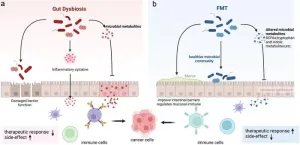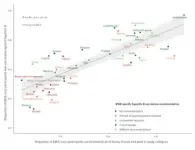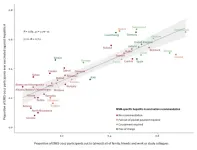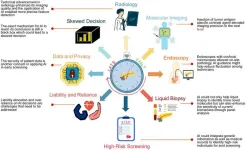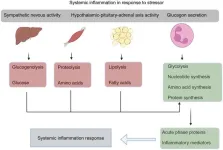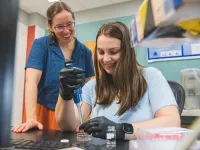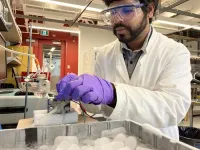Pancreatic ductal adenocarcinoma (PDAC) is recognized as one of the most lethal cancers, with an estimated five-year survival rate of approximately 10%. This poor prognosis is largely attributed to the challenges in early diagnosis, aggressive tumor biology, and limited treatment options. Most PDAC cases are diagnosed at advanced stages due to its typically asymptomatic onset, making only a small percentage of patients eligible for potentially curative surgical resection. In recent years, increasing attention has been paid to the role of gut microbiota dysbiosis in PDAC, as it appears to influence disease progression, immune response, and therapeutic efficacy. Emerging studies suggest that manipulating the microbiome could present novel approaches to screening, diagnosing, and even treating PDAC. Among these strategies, fecal microbiota transplantation (FMT) shows promise as an adjunct therapy, potentially improving patient outcomes through microbiome modulation.
The Human Gut Microbiome
The human gut is home to trillions of microorganisms, forming a complex ecosystem that interacts with the host in numerous ways. This gut microbiota impacts various physiological processes, including immune regulation, nutrient absorption, and metabolism. A stable and diverse microbiota generally contributes to health, whereas shifts in microbial composition can lead to disease. Factors such as diet, lifestyle, age, and medication, especially antibiotics, influence the microbiome composition. Although defining a “healthy” gut microbiota is challenging due to individual variation, five primary bacterial phyla—Firmicutes, Bacteroidetes, Actinobacteria, Proteobacteria, and Verrucomicrobia—are typically dominant. Dysbiosis, or microbial imbalance, is increasingly implicated in the onset and progression of diseases like PDAC, underscoring the need to explore gut microbiota's role in cancer and other systemic conditions.
Gut Dysbiosis in PDAC
Research highlights significant alterations in the gut microbiota composition of PDAC patients compared to healthy individuals. For instance, studies using stool samples have identified a higher abundance of Streptococcus and Veillonella species in PDAC patients, along with a notable decrease in beneficial strains such as Faecalibacterium prausnitzii. Such patterns suggest that specific microbial profiles may be associated with PDAC, potentially serving as biomarkers for diagnosis or even risk stratification. Other studies indicate an association between Helicobacter pylori infection and increased PDAC risk, suggesting that certain pathogenic bacteria could play a role in PDAC etiology. However, variations across studies point to the influence of geographic and ethnic factors on gut microbiota, highlighting the need for larger, multicenter studies to establish a comprehensive microbiome profile unique to PDAC patients.
Dysbiosis, Immune Regulation, and PDAC
The immune system’s interaction with the gut microbiota is complex, influencing both local and systemic immunity. In PDAC, gut dysbiosis may lead to an immune-suppressive microenvironment, enabling tumor growth. Studies demonstrate that microbial components, such as lipopolysaccharides from gram-negative bacteria, can activate immune pathways that influence tumor progression. For instance, experiments with PDAC models have shown that depleting the gut microbiota can reduce tumor growth, suggesting that certain bacterial populations might actively support an immunosuppressive state. Additionally, bacteria can translocate to the pancreas, where they modulate immune responses within the tumor microenvironment. These findings emphasize the potential of microbiota-based approaches to recalibrate immune responses in PDAC treatment.
Microbiota-Derived Metabolites and PDAC
Gut microbiota produces a variety of metabolites that affect the host’s physiological processes, including inflammation, immune responses, and even tumor cell behavior. Short-chain fatty acids (SCFAs), such as butyrate, are among the most researched microbial metabolites and have been shown to suppress PDAC cell invasiveness in laboratory settings. Other metabolites, including indole-3-acetic acid from Bacteroides species, have demonstrated potential to enhance chemotherapeutic efficacy in PDAC by modifying tumor cell responses to treatment. Notably, these metabolites may also stimulate immune cell function within the tumor microenvironment, offering another pathway through which microbiome-targeted therapies might benefit PDAC patients.
FMT in PDAC Treatment
Fecal microbiota transplantation (FMT) has shown efficacy in treating microbiota-related conditions, particularly in infections like Clostridioides difficile. In cancer therapy, FMT’s potential lies in its ability to restore a balanced gut microbiome, potentially improving immune surveillance and patient tolerance to treatments. Early preclinical studies involving PDAC mouse models reveal that FMT can influence tumor growth and immune infiltration. For example, PDAC-bearing mice receiving FMT from healthy donors displayed slower tumor progression compared to those transplanted with dysbiotic microbiota, underscoring the promise of FMT in modulating the tumor microenvironment.
Combining FMT with Cancer Treatments
Emerging evidence suggests that FMT may enhance the effectiveness of PDAC therapies such as chemotherapy and immunotherapy. The gut microbiota is known to impact drug metabolism and immune responses, which could influence treatment efficacy. For example, certain bacteria can inactivate gemcitabine, a standard chemotherapeutic for PDAC, thereby reducing its effectiveness. FMT could potentially counteract such microbial effects, restoring treatment sensitivity. Moreover, FMT has shown promise in mitigating adverse effects associated with immunotherapy and may hold potential in enhancing response rates in patients undergoing checkpoint blockade treatments. These findings underscore the potential of FMT as a valuable adjunct to current PDAC therapies.
Current Challenges and Perspectives in FMT for PDAC
While FMT holds considerable promise, its clinical application faces several challenges. One primary concern is the risk of transmitting infections from unscreened donors, as highlighted by cases of bacteremia linked to FMT. Rigorous donor screening protocols are essential to minimize such risks, as is continued research to standardize FMT procedures. Additionally, matching donors with recipients based on microbiome characteristics may enhance FMT effectiveness, although such precision-matching approaches are still under development. As research progresses, optimizing FMT protocols, addressing safety concerns, and establishing patient-specific strategies will be essential steps toward realizing FMT’s full potential in PDAC management.
Full text
https://www.xiahepublishing.com/2835-3315/CSP-2024-00017
The study was recently published in the Cancer Screening and Prevention.
Cancer Screening and Prevention (CSP) publishes high-quality research and review articles related to cancer screening and prevention. It aims to provide a platform for studies that develop innovative and creative strategies and precise models for screening, early detection, and prevention of various cancers. Studies on the integration of precision cancer prevention multiomics where cancer screening, early detection and prevention regimens can precisely reflect the risk of cancer from dissected genomic and environmental parameters are particularly welcome.
Follow us on X: @xiahepublishing
Follow us on LinkedIn: Xia & He Publishing Inc.
END
